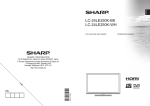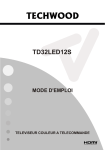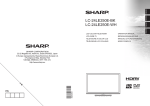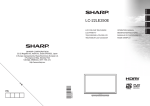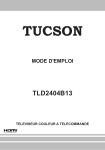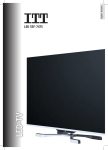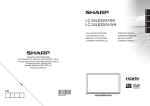Download Finlux 42F7077-D User's Manual
Transcript
Contents Safety Information................................................... 1 Getting Started........................................................ 2 Notifications & Features & Accessories................... 2 Environmental Information ..................................... 2 Standby Notifications............................................... 2 TV Control Switch & Operation............................... 2 Connect Power ....................................................... 3 Specification........................................................... 3 Connections............................................................ 5 First Time Installation - USB Connections............... 6 Media Browser Menu.............................................. 8 TV Menu Features and Functions........................... 9 Using the Channel List...........................................11 Configuring Parental Settings.................................11 Troubleshooting & Tips.......................................... 15 Supported File Formats for USB Mode................. 16 AV and HDMI Signal Compatibility ....................... 16 PC Input Typical Display Modes ........................... 16 Safety Information If there is lightning or storms, or if the TV is not going to be used for a while (e.g. if going away on holiday), disconnect the TV set from the mains. The mains plug is used to disconnect TV set from the mains and therefore it must remain readily operable. The exclamation point within an equilateral triangle is intended to alert the user to the presence of important operating and maintenance (servicing) instructions in the literature accompanying the appliance. To operate your TV in extreme ambient conditions may cause the damage of the device. Note : Follow the on screen instructions for operating the related features. IMPORTANT - Please read these instructions fully before installing or operating WARNING: Never let people (including children) with reduced physical, sensory or mental capabilities or lack of experience and / or knowledge use electrical devices unsupervised. •For ventilation purposes, leave a free space of at least 10 cm all around the set. •Do not block ventilation holes. •Do not place the TV on sloping or unstable surfaces, the TV may tip over. •Use this device in moderate climates. •The power cord plug should be easily accessible. Do not place the TV, furniture, etc. on the power cord. A damaged power cord/plug can cause fire or give you an electric shock. Handle the power cord by the plug, do not unplug the TV by pulling the power cord. Never touch the power cord/plug with wet hands as this could cause a short circuit or electric shock. Never make a knot in the power cord or tie it with other cords. When damaged it must be replaced, this should only be done by qualified personnel. •Do not use this TV in a humid or damp place. Do not expose the TV to liquids. If any liquid falls into the cabinet unplug the TV and have it checked by qualified personnel before operating it any further. •The TV should not be placed near to open flames or sources of intense heat such as an electric heater. •Excessive sound pressure from earphones and headphones can cause hearing loss. • Ensure that no open flame sources, such as lit candles, are placed on top of the TV. •To prevent injury, this TV must be securely attached to the wall in accordance with the installation instructions (if the option is available). •Occasionally, a few non-active pixels may appear on the screen as a fixed blue, green or red point. Please note that this does not affect the performance of your product. Take care not to scratch the screen with fingernails or other hard objects. • Before cleaning, unplug the TV from the wall socket. Only use a soft, dry cloth while cleaning. Warning Serious injury or death risk Risk of electric shock Dangerous voltage risk Caution Injury or property damage risk Important Correctly the system operate •Do not expose the TV to direct sunlight or other heat sources. English - 1 - Notice Additional notes marked Getting Started Notifications & Features & Accessories •Automatic sound mute when no transmission. Environmental Information This television is designed to consume less energy to help save the environment. To reduce energy consumption, you should take the following steps: If you set the Power Save Mode as Eco, the TV will switch to energy-saving mode. The Power Save Mode settings can be found in the ‘Picture’ section of the Main Menu. Note that some picture settings will be unavailable to be changed. If Picture Off is selected, “Screen will be off in 3 seconds.” message will be displayed. Select PROCEED and press OK to continue. The screen will be off immediately. When the TV is not in use, please switch off or disconnect the TV from the mains plug. This will also reduce energy consumption. Standby Notifications •NTSC playback. •AVL (Automatic Volume Limiting). •PLL (Frequency Search). •PC input. •Plug&Play for Windows 98, ME, 2000, XP, Vista, Windows 7. •Game Mode (Optional). Accessories Included •Remote Control •Batteries: 2 x AAA •Instruction Book •Side AV Connection Cable •3D Glasses x 8 TV Control Switch & Operation 1) If the TV does not receive any input signal (e.g. from an aerial or HDMI source) for 5 minutes, the TV will go into standby. When you next switch-on, the following message will be displayed: “Standby Cause No Signal” Press OK to continue. 2) If the TV has been left on and not been operated for a while, the TV will go into standby. When you next switchon, the following message will be displayed. “Standby Cause No Operation” Press OK to continue. Features •3D Viewing: This product supports the 3D viewing function via an available broadcast or via HDMI, PC,YPBPR, USB source. •Remote controlled colour TV. •Fully integrated digital/cable TV (DVB-T/C) •HDMI inputs are for connecting a device that has a HDMI socket. •USB input. •OSD menu system. •Scart socket for external devices (such as DVD Players, PVR, video games, etc.) •Stereo sound system. •Teletext. •Headphone connection. •Automatic programming system. •Manual tuning. •Automatic power down after up to six hours. •Sleep timer. •Child lock. 1.Up direction 2. Down direction 3. Programme/Volume / AV / Standby-On selection switch The Control button allows you to control the Volume/ Programme/ Source and Standby-On functions of the TV. To change volume: Increase the volume by pushing the button up. Decrease the volume by pushing the button down. To change channel: Press the middle of the button, the channel information banner will appear on screen. Scroll through the stored channels by pushing the button up or down To change source: Press the middle of the button twice, the source list will appear on screen. Scroll through the available sources by pushing the button up or down. To turn the TV off: Press the middle of the button down and hold it down for a few seconds, the TV will turn into standby mode. English - 2 - Inserting the Batteries into the Remote Lift the cover on the back of the remote upward gently. Install two AAA batteries. Make sure to match the + and - ends of the batteries in the battery compartment (observe the correct polarity) Replace the cover. Information for Users on Disposal of Old Equipment and Batteries [European Union only] These symbols indicate that equipment with these symbols should not be disposed of as general household waste. If you want to dispose of the product or battery, please consider the collection systems or facilities for appropriate recycling. Notice: The sign Pb below the symbol for batteries indicates that this battery contains lead. Battery Connect Power IMPORTANT: The TV set is designed to operate on 220-240V AC, 50 Hz socket. After unpacking, allow the TV set to reach the ambient room temperature before you connect the set to the mains. Plug the power cable to the mains socket outlet. Products Specification TV Broadcasting PAL B/G D/K K Receiving Channels VHF (BAND I/III) - UHF (BAND U) - HYPERBAND Number of Preset Channels 1000 Channel Indicator On Screen Display RF Aerial Input 75 Ohm (unbalanced) Operating Voltage 220-240V AC, 50Hz. Audio German+Nicam Stereo TRADEMARK ACKNOWLEDGMENT Audio Output Power (WRMS.) (10% THD) 2x8 “Dolby” and the double-D symbol are trademarks of Dolby Laboratories. Power Consumption 85 W Weight 12,20 TV Dimensions DxLxH (with foot) 220 x 976 x 622 TV Dimensions DxLxH (without foot) 69 x 976 x 587 Display 16/9_42” inch Operation temperature and operation humidity: 0ºC up to 40ºC, 85% humidity max Antenna/Cable Connection HDMI 1 HDMI 2 Connect the “aerial” or “cable TV” plug to AERIAL INPUT (ANT) socket located on the back of the TV. SPDIF Coax.OUT Notification Manufactured under license from Dolby Laboratories. “HDMI, the HDMI logo and High-Definition Multimedia Interface are trademarks or registered trademarks of HDMI Licensing LLC.” English - 3 - Getting Started Remote Control 1. Standby / On 2. Channel list 3. Volume up-down 4. Menu on/off 5. OK / Confirm 6. Return / Back 7. No Function 8. My button 1 9. My button 2 (**) 10. Coloured buttons (Red, Green, Yellow, Blue) 11. Mono-Stereo Dual I-II / Current language TV 12. Fast rewind (in media browser mode) 13. Pause (in media browser mode) / Timeshift recording 14. Programme recording 15. Play (in media browser mode) 16. Stop (in media browser mode) 17. Fast forward (in media browser mode) 18. Subtitle on-off / Subtitle (in media browser mode) 19. Image size 20. Teletext - Mix 21. Media Browser 22. Electronic programme guide 23. Exit 24. Navigation buttons 25. Quick menu On-Off 26. Info / Reveal (in TXT mode) 27. Programme up/down 28. Mute 29. Previous programme / Now (in EPG mode) 30. Numeric buttons 31. AV / Source NOTE: The Remote Control range is approximately 7m / 23ft. Using My button 1 (*) Using My Button 2 (**) Press MY BUTTON 1 for five seconds when on a desired source, channel or link, until the “MY BUTTON IS SET” message is displayed on the screen. This confirms that the selected MY BUTTON is now associated with the selected function. Press MY BUTTON 2 for five seconds when on a desired source, channel or link, until the “MY BUTTON IS SET” message is displayed on the screen. This confirms that the selected MY BUTTON is now associated with the selected function. English - 4 - Getting Started Connections Connector Type Cables Device Scart Connection (back) VGA Connection (back) SIDE AV PC/YPbPr Audio Connection (side) Side Audio/Video Connection Cable (Supplied) PC Audio Cable (Not supplied) HDMI Connection (back) SPDIF Connection (back) SIDE AV Side AV Connection (side) HEADPHONE AV Connection Cable (supplied) Headphone Connection HEADPHONE (side) YPbPr Video Connection (back) PC to YPbPr Connection Cable (Not supplied) USB Connection (side) CI Connection CAM module (side) NOTE: When connecting a device via the Side AV input, you must use a connection cables to enable connection. See the illustrations above. | YPbPr can be used only when you connect a device that has a YPbPr output through the PC input with YPbPr to PC cable (YPbPr to PC cable is not supplied). When the connection is made, switch to YPbPr source. To enable PC audio, you will need to use the SIDE AV CONNECTION cable’s WHITE & RED inputs. | If an external device is connected via the SCART socket, the TV will automatically switch to AV mode.| When receiving DTV channels (Mpeg4 H.264) or while in Media Browser mode, output will not be available via the scart socket. | When using the wall mounting kit (optional), we recommend that you plug all your cables into the back of the TV before mounting on the wall. | Insert or remove the CI module only when the TV is SWITCHED OFF. You should refer to the module instruction manual for details of the settings. English - 5 - Getting Started First Time Installation - USB Connections (*) LCN is the Logical Channel Number system that organizes available broadcasts in accordance with a recognizable channel sequence (if available). Switching On/Off To Switch the TV On Connect the power cord to the 220-240V AC, 50 Hz. To switch on the TV from standby mode either: Press the “ ” button, P+ / P- or a numeric button on the remote control. Press the side function switch until the TV comes on from standby. To Switch the TV Off Press the “ “ button on the remote control or press the side function switch until the TV switches into standby mode. To power down the TV completely, unplug the power cord from the mains socket. Note: When the TV is switched to standby mode, the standby LED can blink to indicate that features such as Standby Search, Over Air Download or Timer is active. The LED can also blink when you switch on the TV from standby mode. First Time Installation When turned on for the first time, the language selection screen is displayed. Select the desired language and press OK. The First Time Installation (FTI) screen will be displayed next. Set your preferences using the navigation buttons and when finished, press OK to continue. You can activate Store mode (optional) option to be available in “Other settings” menu and your TV’s settings will be optimized for best display quality. A confirmation screen will be displayed. Select YES to proceed. If Home Mode is selected, Store mode (optional) will not be available after the First Time Installation. Press OK button to continue. Aerial Installation If you select AERIAL option from the Search Type screen, the television will search for digital terrestrial TV broadcasts. NOTE: You can press MENU button to cancel. After all the available stations are stored, the Channel List will be displayed on the screen. If you like how the channels are sorted according to the LCN (*), please select “Yes” and than press OK. Press MENU button to quit channel list and watch TV. Cable Installation If you select CABLE option and press OK button on the remote control. To continue, please select YES and press OK. To cancel operation, select NO and press OK. You can select frequency ranges from this screen. Enter the frequency range manually by using the numeric button. Note: Searching duration will change depending on the selected search step. Media Playback via USB Input You can connect a 2.5” and 3.5” inch (hdd with external power supply) external hard disk drives or USB memory stick to your TV by using the USB inputs of the TV. IMPORTANT! Back up your files before making any connections to the TV. Manufacturer will not be responsible for any file damage or data loss. Certain types of USB devices (e.g. MP3 Players) or USB hard disk drives/memory sticks may not be compatible with this TV. The TV supports FAT32 and NTFS disk formatting but recording will not be available with NTFS formatted disks. While formatting a USB hard disk that has 1TB (Tera Byte) or more file capacity, you can experience problems with the formatting process. Do not repeatedly quickly plug and unplug the drive. This may cause physical damage to the USB player and USB device itself. Do not pull out USB module while playing a file. Recording a Programme IMPORTANT: When using a new USB hard disk drive, it is recommended that you first format the disk using your TV’s “Format Disk” option. Note : To record a programme, you should first connect a USB disk to your TV while the TV is switched off. You should then switch on the TV to enable the recording feature. To use the recording function, you need to connect a USB disk or an external hard disk drive to the TV and the connected USB disk should have at least 1 GB capacity and should have 2.0 speed compatibility. If the connected USB device does not support 2.0 speed, an error message will be displayed. Note: Recorded programmes are saved into the connected USB disk. If desired, you can store/copy recordings onto a computer; however, these files will not be available to be played on a computer. You can play the recordings only via your TV. English - 6 - Note: Lip Sync delay may occur during the timeshifting. Radio record is supported. The TV can record programmes up to ten hours. Recorded programmes are split into 4GB partitions. If the writing speed of the connected USB disk is not sufficient, the recording may fail and the timeshifting feature may not be available. It is recommended to use USB hard disk drives for recording HD programmes. Do not plug out the USB/HDD during a recording. This may harm the connected USB/HDD. Multipartition support is available. The maximum of two different partitions are supported. The first partition of the USB disk is used for PVR ready features. It also must be formatted as the primary partition to be used for the PVR ready features. Some stream packets may not be recorded because of signal problems, so sometimes video may freezes during playback. Record, Play, Pause, Display (for PlayListDialog) keys can not be used when teletext is ON. If a recording starts from timer when teletext is ON, teletext is automatically turned off. Also teletext usage is disabled when there is an ongoing recording or playback. Timeshift Recording Press (PAUSE) button while watching a broadcast to activate timeshifting mode.In timeshifting mode, the programme is paused and simultaneously recorded to the connected USB disk. Press (PLAY) button again to resume the paused programme from where you stopped. Press the STOP button to stop timeshift recording and return to the live broadcast. Note: Timeshift cannot be used while in radio mode. Note : You cannot use the timeshift fast reverse feature before advancing the playback with the fast forward option. Instant Recording Press (RECORD) button to start recording an event instantly while watching a programme. You can press (RECORD) button on the remote control again to record the next event on the EPG. In this case, an OSD will be displayed, indicating the programmed events for recording. Press (STOP) button to cancel instant recording. Watching Recorded Programmes Select the Recordings Library from the Media Browser menu. Select a recorded item from the list (if previously recorded). Press the OK button to view the Play Options. Select an option then press OK button. Note: Viewing main menu and menu items will not be available during the playback. Press the (STOP) button to stop a playback and return to the Recordings Library. Slow Forward If you press (PAUSE) button while watching recorded programmes, the slow forward feature will be available. You can use button to slow forward. Pressing button consecutively will change slow forwarding speed. Recording Configuration Select the Recording Configuration item in the Settings menu to configure the recording settings. Format Disk: You can use Format Disk feature for formatting the connected USB disk. Your pin is required to use the Format Disk feature (default pin is 0000). IMPORTANT: Note that ALL the data stored on the USB disk will be lost and the disk format will be converted to FAT32 if you activate this feature. If your USB disk malfunctions, you can try formatting the USB disk. In most cases formatting the USB disk will restore normal operation; however, ALL the data stored on the USB disk will be lost in such a case. Note: If “USB is too slow” message is displayed on the screen while starting a recording, try restarting the recording. If you still get the same error, it is possible that your USB disk does not meet the speed requirements. Try connecting another USB disk. Quick Menu Quick Settings menu allows you to access some options quickly. This menu includes Power Save Mode, 3D Mode, Picture Mode, Equalizer Settings, Favourites and Sleep Timer options. Press Q.MENU button on the remote control to view quick menu. See the following chapters for the details of the listed features. Note: You can not switch broadcasts or view the Media Browser during the recording mode. While recording a programme or during the timeshifting, a warning message appears on the screen if your USB device speed is not sufficent. English - 7 - Media Browser Menu You can play photo, music, and movie files stored on a USB disk by connecting it to your TV. Connect a USB disk to one of the USB inputs located on the side of the TV. Pressing the MENU button while in the Media Browser mode will access the Picture, Sound and Settings menu options. Pressing the MENU button again will exit from this screen. You can set your Media Browser preferences by using the Settings Menu. Loop/Shuffle Mode Operation S t a r t p l a y b ack w i th an d a ctivate TV plays next file and loop the list. Start playback with OK and activate the same file will be played in a loop (repeat). Start playback with OK/ the file will be played in a shuffle. and activate English - 8 - TV Menu Features and Functions Picture Menu Contents 3D Settings Press to view 3D settings. Mode You can change the picture mode to suit your preference or requirements. Picture mode can be set to one of these options: Cinema,Game, Sport ,Dynamic and Natural. Contrast Sets the lightness and darkness values of the screen. Brightness Sets the brightness value for the screen. Sharpness Sets the sharpness value for the objects displayed on the screen. Colour Sets the colour value, adjusting the colors. Power Save Mode To set the Power Save Mode as Eco, Picture Off and Disabled. (When the Mode is Dynamic, Power Save mode is automatically set as disabled.) Backlight (Optional) This setting controls the backlight level. The backlight function will be inactive if the Power Save Mode is set to Eco. The backlight cannot be activated in VGA, Media Browser mode or while the picture mode is set to Game. Noise Reduction If the broadcast signal is weak and the picture is noisy, use the Noise Reduction setting to reduce the amount of noise. Advanced Settings Dyanmic Contrast You can change the Dynamic Contrast ratio to desired value. Colour Temp Sets the desired colour tone. Sets the desired picture size from picture zoom menu. Picture Zoom Note: Auto (Only available in Scart mode with SCART PIN8 high voltage/low voltage switching) HDMI True Black (optional) While watching from HDMI source, this feature will be visible in the Picture Settings menu. You can use this feature to enhance blackness in the picture. Film Mode Films are recorded at a different number of frames per second to normal television programmes. Turn this feature on when you are watching films to see the fast motion scenes clearly. Skin Tone Skin tone can be changed between -5 and 5. Colour Shift Adjust the desired colour tone. RGB Gain You can configure the colour temperature values using the RGB Gain feature. Reset Resets the picture settings to factory default settings.(Except Game Mode) Autoposition (in PC mode) Automatically optimizes the display. Press OK to optimize. H Position (in PC mode) This item shifts the image horizontally to the right hand side or left hand side of the screen. V Position (in PC mode) This item shifts the image vertically towards the top or bottom of the screen. Dot Clock (in PC mode) Dot Clock adjustments correct the interference that appear as vertical banding in dot intensive presentations like spreadsheets or paragraphs or text in smaller fonts. Phase (in PC mode) Depending on the resolution and scan frequency that you input to the TV set, you may see a hazy or noisy picture on the screen. In such a case you can use this item to get a clear picture by trial and error method. While in VGA (PC) mode, some items in Picture menu will be unavailable. Instead, VGA mode settings will be added to the Picture Settings while in PC mode. English - 9 - Sound Menu Contents Volume Adjusts the volume level. Equalizer Selects the equalizer mode. Custom settings can be made only when in user mode. Balance This setting is used for emphasizing left or right speaker balance. Headphone Sets headphone volume. Sound Mode You can select a sound mode. (If the selected channel supports). AVL (Automatic Volume Limiting) Function sets the sound to obtain fixed output level between programmes. (Optional) When you connect an external amplifier to your TV using the headphone jack, you can select this option as Lineout. If you have connected headphones to the TV, set this option as Headphone. Dynamic Bass Enables or disables the Dynamic Bass. Surround Sound (Optional) Surround sound mode can be changed as On or Off. Digital Out Sets digital out audio type. Headphone/Lineout Settings Menu Contents Conditional Access Controls conditional access modules when available. Language Configures language settings (may change depending on the country selected) P re fe r r e d a n d c u r r e n t s e tti n g s will be available. Current settings can be changed only if the broadcaster supports. Parental Enter correct password to change parental settings. You can easily adjust menu lock, maturity lock(may change depending on the country selected) and child lock in this menu. You can also set new pin number. Timers Sets sleep timer to turn off the TV after a certain time. Sets timers for selected programmes. (USB Record). Recording Configuration Displays the recording configuration menu (Usb connection required). Date/Time Sets date and time. Sources Enables or disables selected source options. Other Settings: Displays other setting options of the TV set: Menu Timeout Changes timeout duration for menu screens. Scan Encrypted Channels When this setting is on, the search process will locate the encrypted channels as well. Blue Background Activates or deactivates the blue background system when the signal is weak or absent. Software Upgrade To ensure that your TV always has the most up to date firmware. Application Version Displays application version. Hard of Hearing Enables any special feature sent from the broadcaster. Audio Description Audio description refers to an additional narration track for blind and visually impaired viewers of visual media, including television and movies. You can use this feature, only if the broadcaster supports that additional narration track. Note: Audio description sound feature cannot be available in recording or time shifting mode. Auto TV Off You can set the timeout value of auto off feature. When the timeout value is reached and the TV has not been operated for a selected time, the TV will go into standby mode. Standby Search (Optional) If the Standby Search is set to On, when the TV is in standby mode, available broadcasts will be searched. If the TV locates any new or missing broadcasts, a menu screen will be displayed, asking you whether or not to execute these changes. Channel list will be updated and changed after this process. English - 10 - Store Mode (optional) Power Up Mode If you are displaying the TV in a store, you can activate this mode. Whilst Store Mode is enabled, some items in the TV menu may not be available. This setting confrigures the power up mode preference. Install and Retune Menu Contents Displays automatic tuning options. Automatic Channel Scan (Retune) (If available) Digital Aerial: Searches and stores aerial DVB stations. Digital Cable: Searches and stores cable DVB stations. Analogue: Searches and stores analogue stations. Digital Aerial & Analogue: Searches and stores aerial DVB and analogue stations. Digital Cable & Analogue: Searches and stores cable DVB and analogue stations. Manual Channel Scan This feature can be used for direct broadcast entry. Network Channel Scan Searches for the linked channels in the broadcast system. Analogue Fine Tune You can use this setting for fine tuning analogue channels. This feature is not available if no analogue channels are stored. First Time Installation Deletes all stored channels and settings, resets TV to factory settings. General TV Operation Using the Channel List The TV sorts all stored stations in the Channel List. You can edit this channel list, set favourites or set active stations to be listed by using the Channel List options. Configuring Parental Settings To prohibit viewing of certain programmes, channels and menus can be locked by using the parental control system. To display parental lock menu options, the PIN number should be entered. The factory default PIN number is 0000. After coding the correct PIN number, parental settings menu will be displayed. INFO(İ): Displays, in detailed, information on the programme selected. GREEN: Switches to List Schedule EPG. YELLOW: Switches to Timeline Schedule EPG. BLUE: Displays filtering options. (RECORD): The TV will start to record the selected progamme. You can press again to stop the recording. IMPORTANT: Connect a USB disk to your TV while the TV is switched off. You should then switch on the TV to enable the recording feature. Menu Lock (optional): Menu lock setting enables or disables the menu access. Note: Switching to a different broadcast or source is not available during a recording. Maturity Lock (optional): When set, this option gets the maturity information from the broadcast and if this maturity level is disabled, disables access to the broadcast. Programme Options Child Lock (optional): When Child Lock is set, the TV can only be controlled by the remote control. In this case the control panel buttons will not work. Set PIN: Defines a new PIN number. Note: If the Country option is set to France, you can use 4725 as the default code. Electronic Programme Guide (EPG) Some, but not all channels send information about the current and next programmes. Press the ” ” button to view the EPG menu. Up/Down/Left/Right: Navigate EPG. OK: Displays programme options. In EPG menu, press the OK button to enter the Event Options menu. Select Channel In EPG menu, using this option, you can switch to the selected channel. Record / Delete Record Timer After you have selected a programme in the EPG menu, press the OK button. Select the Record option and press the OK button. After this operation, a recording will be scheduled for the selected programme. To cancel an already set recording, highlight that programme and press the OK button and select the option Delete Rec. Timer. The recording will be cancelled. English - 11 - Set Timer / Delete Timer After you have selected a programme in the EPG menu, press the OK button. Select the Set Timer on Event option and press the OK button. You can set a timer for future programmes. To cancel an already set timer, highlight that programme and press the OK button. Then select “Delete Timer” option. The timer will be cancelled. Note: It is not possible to record two channels at the same time..Software Upgrade Your TV is capable of finding and updating automatically via the Aerial/Cable signal or over the Internet. Software upgrade search via user interface Simply navigate on your main menu. Choose Settings and select Other Settings menu. In Other Settings menu navigate on to the Software for Upgrade item and press OK button to check for a new software upgrade. Note : Internet connection is needed. If an internet connection is not available, try to upgrade via broadcast. If a new upgrade is found, it starts to download the upgrade. Press OK to continue with the reboot operation. 3 AM search and upgrade mode While the TV is connected to an aerial signal. If Automatic scanning in the Upgrade Options menu is enabled, the TV wakes up at 03:00 and searches broadcast channels for new software upgrades. If new software is found and downloaded successfully, the next time the TV powers up , it will have the new software version. Note: If the TV fails to come on after the upgrade unplug the TV for 2 minutes and plug in again. Using the 3D Mode Precautions For your safety ; Read these safety precautions carefully before using the 3D function. •You may experience discomfort, headaches or dizziness while watching 3D images. If you experience such symptoms, you should remove 3D glasses and stop watching 3D mode. •Do not watch in 3D mode for long periods of time. Allow yourself occasional rests. During viewing, if you experience any discomforts such as eye-strain, headache or nausea; take off the 3D glasses and stop watching in 3D mode. Consult a doctor if the discomforts persist. •Children should be supervised by adults while watching in 3D. If they experience similar discomforts mentioned above, have them stop watching in 3D immediately. •Do not use the 3D Glasses as sunglasses or general eyeglasses. •Do not move around while watching in 3D and wearing the glasses as your vision is modified and you may run into objects which may result in injuries. •Use only the supplied 3D glasses. •If you experience screen flickering when watching 3D images in poor light conditions, you should turn the lamp off or dim the light. •While wearing headphones do not adjust the volume to excessive levels as this may result in temporary or permanent hearing loss. CAUTION - 3D Images •Read these safety instructions carefully to prevent damage.and ensure your personal safety. •Consult an optometrist if you experience any diffictulties while watching in 3D with your 3D glasses. •You may experience headaches or fatigue when viewing 3D images with your 3D glasses for too long. •If you experience headaches, fatigue, or dizziness, stop watching immediately. The following people should not use the 3D Mode: •Pregnant women, seniors, people with heart conditions, as well as people who can get easily nauseous •When watching in 3D be aware of your surroundings. Do not watch in an environment with breakable objects nearby. •Use 3D Glasses for watching 3D video only. Do not use them as sunglasses or reading glasses. •Do not apply spray cleaners directly onto the surface of the 3D Glasses.This may result in discoloration and cracks and may cause the screen display to peel off. •Make sure the cleaning cloth is soft and does not contain any foreign material or dust. Using a dirty cloth will damage your 3D glasses. •Do not drop or bend the 3D glasses. •If the receiving range is out of the specified range, the screen may not be viewable as 3D video. Health Warning! - 3D Images •When watching 3D images, you should leave a distance of at least twice the screen width, and you should keep the screen at eye level. •Do not watch 3D images too closely or for long periods of time. This may cause drowsiness, fatigue and / or eye damage. If you experience these problems stop watching in 3D immediately. Pregnant women, seniors, people with heart problems or people who experience frequent drowsiness should refrain from watching 3D. Some content in 3D may cause the viewer to perform sudden reflex movements such as ducking or dodging; therefore English - 12 - it is important to not place any fragile objects near the television. Please prevent children under the age of 5 from watching 3D. It may affect their vision development. Warning for photosensitization seizure •If you or a member of your family has a history of epilepsy or seizure, please consult with your doctor before watching 3D TV. It is possible that some viewers may experience a seizure or epilepsy when exposed to certain conditions, including flashing lights or images in TV or video games. •Sometimes certain symptoms can occur in unspecified conditions even if you do not have any previous history. In such a case, if you experience any of the following symptoms, immediately stop watching the 3D TV and consult a doctor: •altered vision, visual or facial instability, such as eye or muscle twitching, dizziness or light-headedness, visual transition or unconscious action, convulsion, loss of conscience, confusion or disorientation, loss of directional sense, cramps, or nausea. •When watching 3D TV, monitor your children, including teenagers because they may be more sensitive to the effects of watching 3D such as these symptoms. •You can reduce the risk of photosensitization seizure by taking the following actions: •While watching the 3D TV, do take frequent breaks. If you have vision that is different in each eye, you should watch the TV after taking vision correction measures. •Do not watch the TV too closely and try always keep the television at eye level. Do not watch the 3D TV when you are tired or sick. Avoid watching the 3D TV for a long period of time. •Do not use the 3D glasses for other purposes. •Press SOURCE button and select the connected input. •You should select suitable 3D Mode before viewing. •To view 3D contents or programmes in 3D mode you must wear the supplied 3D Glasses. 3D Mode Press MENU button and select Picture icon by using “ ” or “ ” button and press OK. Use “ ” or “ ” to select 3D settings and press OK to view. •3D feature enables you to view 3D content using the supplied 3D glasses. •To enable and customize 3D mode on the TV, perform the following: •Press MENU button on the remote control and select Picture by using “ ” or “ ” button. Press OK button to view Picture Settings. Select 3D Settings option by using “ ” or “ ” button and press OK. 3D Settings Mode You can customize the 3D mode to a setting that meets your viewing preferences Auto: Automatically switches to 3D mode when 3D content is detected through HDMI. Side by Side: Displays 3D content side by side. Top bottom: Displays 3D content which is originally in a form of top and bottom. Off: 3D function mode is turned off. 2D Only If content is 3D but you want to watch it in 2D, you can switch to 2D only mode. There are 2 options (LEFT and RIGHT) to select which side of the content you want to watch in 2D. •Some viewers may feel disoriented afler watching 3D. Therefore, after you watch 3D, take a moment to regain awareness of your surrounding before moving. Virtual 3D •You must look straight ahead and the TV must be at eye level while wearing the 3D glasses. The picture may not be visible or may look dark if you do not stay within the viewing angle. You can use this setting to shift the phase of the 3D left/right broadcast. Operating the 3D Mode The transition from 2D to 3D. You can adjust the field of depth to various settings or turn it off. Left/Right Swap 3D Depth Sense (optional) This setting enables the control of 3D depth. •3D picture may not be visible or become distorted when watching under dense light conditions. •You can enjoy viewing 3D images on your TV by wearing the supplied 3D Glasses. Note that this TV’s 3D feature works only with its specific 3D glasses. •Connect a 3D compatible player via an HDMI cable and play the 3D content. Refer to the manual of the player for the settings of the player. English - 13 - 3D Viewing Information Refer to the size / distance guidelines below to experience 3D in the best possible way. Viewing Distance Size (inch) Viewing distance (m) Size (inch) Viewing distance (m) 22 26 32 37 40 1,30 1,50 1,90 2,20 2,40 42 46 47 55 2,50 2,75 2,80 3,25 Horizontal Viewing Angle 45 3D Viewing Information - continued 45 Vertical Viewing Angle It is strongly recommended that the TV is placed at a height as same as the eye level of the viewer. In case that is not possible, tilt the TV accordingly in its stand or wall mount. HDMI MBV MBP 1080p@24 FP Supported Not Supported Not Supported 720p@50 FP Supported Not Supported Not Supported 720p@60 FP Supported Not Supported Not Supported 1080p FC SBS, TB SBS, TB SBS, TB 720p FC SBS, TB SBS, TB SBS, TB 1080i FC SBS SBS SBS OTHER Not Supported Not Supported (*) DTV ATV OTHER 1080p@24 FP Not Supported Not Supported Not Supported 720p@50 FP Not Supported Not Supported Not Supported 720p@60 FP Not Supported Not Supported Not Supported 1080p FC SBS, TB Not Supported SBS, TB 720p FC SBS, TB Not Supported SBS, TB 1080i FC SBS Not Supported SBS OTHER (*) Not Supported Not Supported English - 14 - Please note that if you apply 720p FC TB input; the picture will be scaled smaller than the original size in the middle of the screen. SBS: Side By Side Input sources - can not be selected •If you cannot select an input source, it is possible that no device is connected. if not •Check the AV cables and connections if you have tried to connect a device. TB: Top Bottom MBP: Media Browser Picture Recording unavailable MBV: Media Browser Video FC: Frame Compatible FP: Frame Pack in MBP: Supported only when, the image’s height is multiples of 2 and the image’s width is multiples of 16 and if the image width is equal to the panel width or wider. in DTV: Supported only when, the image’s height is between 1700 and 1900 and the image’s width is equal to 1280 or 720. (*): Not supported if the image provides 1080i resolution. Troubleshooting & Tips Tv will not turn on Make sure the power cord is plugged in securely to wall outlet. The batteries in the remote control may be exhausted. Press the Power button on the TV. Poor picture • Have you selected the correct TV system? • Low signal level can cause picture distortion. Please check antenna access. • Check if you have entered the correct channel frequency if you have done manual tuning. • The picture quality may degrade when two devices are connected to the TV at the same time. In such a case, disconnect one of the devices. No picture • No Picture means that your TV is not receiving a transmission. Have you selected the correct button on the remote control? Try once more. Also make sure the correct input source has been selected. To record a programme, you should first connect a USB disk to your TV while the TV is switched off. You should then switch on the TV to enable recording feature. If you cannot record, try switching off the TV and then re-inserting the USB device. USB is too slow If a “USB is too slow” message is displayed on the screen while starting a recording, try restarting the recording. If you still get the same error, it is possible that your USB disk does not meet the speed requirements. Try connecting another USB disk. Teletext Press ” ” button to enter. Press again to activate mix mode. Press once more to exit. Follow the instructions displayed on digital teletext screen. Digital Teletext (for UK only) Press ” ” button to view digital teletext information. Operate it with the coloured buttons, cursor buttons and the OK button. The operation method may differ depending on the contents of the digital teletext. Follow the instructions displayed on the digital teletext screen. When the ” ” button is pressed again, the TV returns to television broadcast. •Is the antenna connected properly? •Is the antenna cable damaged? •Are suitable plugs used to connect the antenna? •If you are in doubt, consult your dealer. No sound •Has the TV been set to mute? To cancel mute, press the “ ” button, or increase the volume level. •Sound is coming from only one speaker. Is the balance set to one extreme? See Sound Menu section. Remote control - does not operate •The batteries may be exhausted. Replace the bateries. English - 15 - PC Input Typical Display Modes AV and HDMI Signal Compatibility The following table is an illustration of some of the typical video display modes. Your TV may not support all resolutions. Your TV supports up to 1920x1080. Source Supported Signals Available PAL 50/60 O Index Resolution Frequency EXT NTSC 60 O 1 640x350p 60 Hz (SCART) RGB 50 O 2 640x400p 60 Hz RGB 60 O 3 1024x768 60 Hz 4 1280x768 60 Hz PAL 50/60 O 5 1360x768 60 Hz NTSC 60 O 6 720x400 60 Hz 7 800x600 56 Hz 8 800x600 60 Hz 9 1024x768 60 Hz 10 1024x768 66 Hz 11 1280x768 60 Hz 12 1360x768 13 Side AV 480I, 480P 60Hz O 576I, 576P 50Hz O 720P 50Hz,60Hz O 1080I 50Hz,60Hz O 1080P 50Hz,60Hz O 480I 60Hz O 60 Hz 480P 60Hz O 1280x1024 60 Hz 576I, 576P 50Hz O 14 1280x960 60 Hz 720P 50Hz,60Hz O 15 1280x1024 60 Hz 16 1400x1050 60 Hz 50Hz,60Hz O 17 1600x1200 60 Hz 18 1920x1080 60 Hz PC/ YPbPr HDMI1 HDMI2 HDMI3 1080I 24Hz, 25Hz 1080P 30Hz, 50Hz, 60Hz O (X: Not Available, O: Available) In some cases a signal on the LED TV may not be displayed properly. The problem may be an inconsistency with standards from the source equipment (DVD, Set-top box, etc. ). If you do experience such a problem please contact your dealer and also the manufacturer of the source equipment. Supported File Formats for USB Mode Media Movie File Extension Format Remarks Video Audio .mpg .mpeg MPEG1,2 MPEG Layer 1/2/3 .dat MPEG1,2 .vob MPEG2 .mkv H.264, MPEG1,2,4 EAC3/ AC3 .mp4 MPEG4, Xvid 1.00, Xvid 1.01, Xvid 1.02, Xvid 1.03, Xvid 1.10-beta1/2, H.264 PCM/MP3 (Maximum resolution/Bit rate etc.) MPEG2 MAX 1920x1080 @ 30P 20Mbit/sec MPEG2, MPEG4 Music Photo Subtitle .avi Xvid 1.00, Xvid 1.01, Xvid 1.02, Xvid 1.03, Xvid 1.10-beta1/2, H.264 PCM .mp3 - MPEG 1 Layer 1 / 2 (MP3) 32KHz ~ 48KHz(Sampling rate) .jpg .jpeg Baseline JPEG - max WxH = 15360x8640 4147200bytes . Progressive JPEG - max WxH = 9600x6400 3840000bytes .bmp - - max WxH = 5760x4096 3840000bytes .sub .srt - - - English - 16 - 32Kbps ~ 320Kbps(Bit rate) Important Instruction For your own safety read following instruction carefully before attempting to connect this unit to the mains supply. MAINS (AC) OPERATION The wires in the mains lead are coloured in accordance with the following code : GREEN & YELLOW (Earth) (if there is earth cable) FUSE BROWN (Live) BLUE IMPORTANT (Neutral) As the colours of the wires in the mains lead of this appliance may not correspond with the coloured markings identifying the terminals in your plug, proceed as follows: The wire which is coloured green and yellow must be connected to the terminal which is marked with the letter E, or by the earth symbol, or coloured green or green and yellow. The wire which is coloured blue or black must be connected to the terminal which is marked with the letter N or coloured Black. The wire which is coloured brown or red must be connected to the terminal which is marked with the letter L or coloured Red. For continued protection against risk of fire, replace only with same type and rating of fuse (ASTA approved 5A 250VAC fuse). CAUTION TO PREVENT ELECTRIC SHOCK DISCONNECT FROM THE MAINS BEFORE REMOVING COVER. NO USER SERVICEABLE PARTS INSIDE. REFER SERVICING TO QUALIFIED SERVICE PERSONNEL. SAFETY PRECAUTION THIS EQUIPMENT MUST BE DISCONNECTED FROM THE MAINS WHEN NOT IN USE. DO NOT ALLOW THIS UNIT TO BE EXPOSED TO RAIN OR MOISTURE. English - 17 - A Product Fiche B Commercial Brand: FINLUX C Product No. 10087594 D Model No. 42F7077-D E Energy efficiency class A F J Visible screen size (diagonal, approx.) (inch/cm) On mode average power consumption (Watt) Annual energy consumption (kWh/annum) Standby power consumption (Watt) Off mode power consumption (Watt) K Display resolution (px) G H I 42 inches English - 18 - 106 cm 69 100 0,5 0 1920 x 1080



























